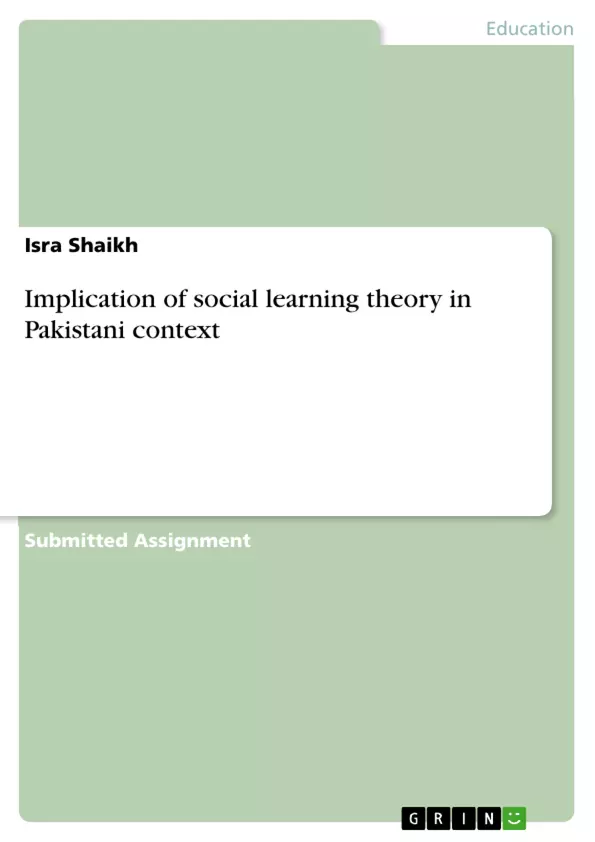This extensive paper plans to investigate a portion of the implications of crafted by incredible scholars to work for a helpful domain for instructing and learning English in Pakistani schools.This paper exhibits the option just as thoughts of both Bandura and Vygotsky on various issues, for example, child’s formative stages, egocentric discourse in youngsters, significance of language and the job of the educator and understudy in language learning. The ramifications of their converging thoughts for advancing a strong domain for English language instructing and learning in Pakistan is then talked about in the paper. Its overall talks about the how learning should made interesting while acquiring second language.
Inhaltsverzeichnis (Table of Contents)
- Introduction
- Literature review
- Classroom Context of Pakistan
- Vygotsky's Teaching Learning Process
- Implication of Social Learning Theory In Our Educational System
- Observational Learning
- State of Mind
- Conclusion
Zielsetzung und Themenschwerpunkte (Objectives and Key Themes)
This paper explores the application of social learning theories in the context of English language instruction within Pakistani schools. The paper examines the works of Bandura and Vygotsky, specifically their perspectives on child development, egocentric speech, the importance of language, and the roles of educators and learners in language acquisition. It then analyzes the implications of these convergent ideas for fostering an effective environment for English language teaching and learning in Pakistan. The paper emphasizes the importance of making learning engaging and enjoyable within the context of second-language acquisition.
- The role of social learning theories in English language teaching
- The impact of Vygotsky's ideas on teaching and learning
- The significance of language in cognitive development
- The importance of engaging and enjoyable learning environments
- The challenges of implementing social learning theories in Pakistani schools
Zusammenfassung der Kapitel (Chapter Summaries)
- Introduction: This chapter discusses the growing importance of English in the globalized world and its significance in Pakistan. It highlights the lack of reform in English language teaching and learning in Pakistan, contrasting the current situation with the need for more effective and learner-centered approaches. Vygotsky's theory on social interaction and its role in cognitive development are introduced.
- Literature Review: This chapter examines the general quality of education in Pakistan and how traditional methods, often focused on rote learning and memorization, fall short in promoting critical thinking and creativity. It explores the complex and evolving nature of teacher training and the crucial role it plays in educational reform, drawing attention to the need for a more responsive and dynamic approach to teacher education.
- Classroom Context of Pakistan: This chapter provides a snapshot of English language teaching practices in Pakistani schools. It highlights the dominance of the Grammar Translation Method in government schools and the greater adoption of direct methods in private institutions. The discussion emphasizes the need for a more diverse range of teaching approaches to cater to the unique needs of learners.
- Vygotsky's Teaching Learning Process: This chapter explores Vygotsky's ideas on the relationship between instruction and cognitive development. It introduces the concept of the Zone of Proximal Development (ZPD) and its implications for teacher-student interactions. The chapter also introduces Bandura's Social Learning Theory, emphasizing the importance of live, symbolic, and representative learning models.
- Implication of Social Learning Theory In Our Educational System: This chapter explores the application of social learning theories within the Pakistani context. It critiques the continued reliance on traditional methods, such as the Grammar Translation Method, and emphasizes the need for a more learner-centered approach. The chapter acknowledges the challenges of implementing these theories in large classroom settings, highlighting the need for further research and exploration.
Schlüsselwörter (Keywords)
The primary focus of this work is on social learning theory, its application in English language teaching, and the challenges of implementing such theories in the Pakistani educational context. Key themes include: second language acquisition, Vygotsky’s Zone of Proximal Development, Bandura's Social Learning Theory, teacher training, classroom practices, and the need for pedagogical reform.
Frequently Asked Questions
What is the focus of this paper regarding English teaching in Pakistan?
The paper investigates how social learning theories, specifically from Bandura and Vygotsky, can create a more helpful environment for teaching English in Pakistani schools.
What is Vygotsky's "Zone of Proximal Development" (ZPD)?
It is a core concept describing the distance between what a learner can do alone and what they can do with guidance from a teacher or peer.
How does Bandura's theory contribute to language learning?
Bandura emphasizes observational learning through live, symbolic, and representative models, which is crucial for acquiring a second language.
What are the main challenges in Pakistani classrooms?
Challenges include a heavy reliance on rote learning, the dominance of the Grammar Translation Method, and large class sizes that hinder interactive learning.
Why is English significant in the Pakistani context?
English is seen as a vital tool for success in a globalized world, yet the teaching methods in government schools often lack modern pedagogical reform.
- Quote paper
- Isra Shaikh (Author), 2019, Implication of social learning theory in Pakistani context, Munich, GRIN Verlag, https://www.grin.com/document/489913



